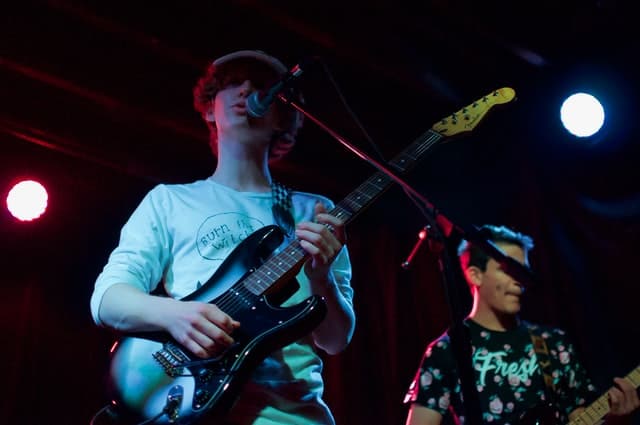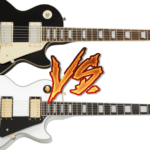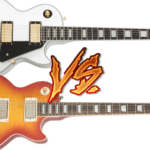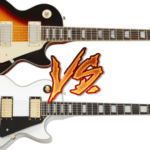Getting a good reggae tone isn’t too difficult if you know what to look out for, mainly you want a bright, clear, fat tone and there are tons of guitars out there for that.
Reggae can be played on almost any kind of guitar, even though there are some preferred ones by the pros:
Here are 7 of the best guitars for reggae:
- Stratocaster guitars
- Telecasters
- PRS Custom 22/24
- Gibson Les Paul
- Epiphone Les Paul
- Ibanez SG Alternatives
- Epiphone SG
They say that tone is all in the fingers, and while I agree, it can’t be denied that the guitar you play will either enhance or diminish your playing and tone.
Each guitarist has their preferences and while I’m sure there are many other guitars suited for reggae, I’m keeping it down to seven for simplicity today. So here are my recommendations:
1. Fender Stratocaster
Strats are generally known as some of the best guitars for reggae. Owing to their bright tone qualities, they’re great for cutting through the heavy bass of reggae.
And if you’re feeling like adding a bit of smoothness to your playing, their neck and middle pickups work great as an option.
Many Reggae players play on a strat, even Bob Marley himself did, at least before he switched over to the Les Paul (more on that later).
Strats are versatile guitars, they’re great for both rhythm and lead and their light weight makes them a lot more comfortable than some of the other options on this list.
They’re also pretty lightweight compared to the Epiphone or Gibson which contributes to their comfort.
The Stratocaster also sits at number one for me because it’s not an overly expensive guitar. Marley likely started out on this guitar, like so many musicians do, because of how affordable it is. It’s great quality at a very reasonable price.
While strat bodies may not be as fancy as some of the Gibson bodies are, frankly, that sort of thing doesn’t appeal to me anyway. I like solid color and a nice finish.
The last thing I can say about these guitars that makes them ideal for reggae is their customizability. It’s pretty easy to swap out parts on a strat, especially the pickups. Most of the electronics are built into the front side of the guitar, which makes them easy to access.
2. Fender Telecasters
While the Strat and the Telecaster share many similarities, the Telecaster comes in as a second to the Strat, mainly because it’s a little less versatile.
As far as its design goes, the Telecaster lacks a whammy bar and has one less pickup than the Strat, but newer models share the same cutaway, which is nice.
The fretboard is also usually Maple, which provides for a more snappy response and brighter tone than the rosewood on a standard Strat.
The Tele’s pickups are more suited to old-style blues and country music, but the neck pickup (Twisted Tele Pickup) does quite well for reggae. Unfortunately, this means you’ll be stuck on that one pickup whenever you want to play reggae music with this guitar.
That’s not to say that it’s a bad choice though, many famous musicians have used the Tele to make reggae, even Stephen Marley has, alongside other greats like Earl Chinna Smith, Stuart Wilson, and many more.
If you’re creative with your playing, you could probably develop something more unique as Teles tend to have a wider frequency response too.
The advantage that Telecasters have over the Strat is that they are easier to tune and according to some players, also easier to play. Perhaps that’s why some reggae players prefer it over the strat.
3. PRS custom 22/24
PRS’s Custom series has a nicely suited tone for reggae and while their 22 is discontinued, their 24 model is still a great fit for the genre.
They’re not as popular as some of the other choices on this list, but they make for a decent alternative if you can’t afford to fork out for a Gibson but still want that rounder New Reggae tone.
The PRS Custom 24 recently released a 2020 model that is just a thing of beauty.
But cosmetics aside, what makes it good for playing reggae?
It’s a pretty versatile guitar for one.
The pickups have five positions, using the two humbucker sets in different combinations, allowing for the use of the humbuckers as such or isolating their individual single-coils.
I think this is a pretty cool and unique feature that makes the PRS stand out for me.
It has a carved figured maple and mahogany body, with a 24-fret (hence the name) fretboard made of Rosewood. It comes with a tremolo bar, which, while it’s not usually used in reggae, it’s nice to have as an option.
Overall, the PRS is the underdog of reggae music, and while it’s not as widely known as the Strat in this genre, there are still some musicians that use it.
4. Gibson Les Paul
The Gibson Les Paul is notably better than the PRS, but it’s lower on the list because of one main drawback- they’re far more expensive than most of the other guitars here.
Gibson guitars are generally known for being amazing guitars, and while some musicians in reggae switched over to them later in their careers, a lot of players have found problems with their Gibsons lately.
The Les Paul doesn’t produce quite as traditional a reggae sound as the Strat does, but it’s most prominent in more modern reggae bands like Rebelution and Iration.
They are however pretty well suited to rhythm playing in Reggae, but they’re not as bright as the Strat when it comes to lead and that makes them less suitable for the genre, they’re great for metal though.
While you may not get the clear, brightness needed to cut through the mix of a reggae song with the Gibson, it still suits well for more rounded tones in modern reggae.
I think most of the reason why guitar players like Marley started using a Gibson down the line is that most amateur or self-funded musicians can’t afford the large price tag and maybe Marley was just experimenting with a different sound now that he could afford it.
5 Epiphone Les Paul
A nice alternative to the Gibson, the Epiphone Les Paul comes with the same design and feel, at a fraction of the market cost of a Gibson.
Just like the Gibson, these guitars are known for their P90 pickups, producing the iconic fat, crunchy tones. This makes it a well-suited alternative to the Gibson to play in this genre
The Epiphone has a wider neck shape and is a lot heavier than some of the other models, but its design and feel are something to be noted. It’s a beautiful guitar, playing aside.
The main downside to this guitar is that the electronics are skimped on a little. But if you find yourself with some spare change down the line, you can always upgrade it. It’ll still cost you less than buying a Gibson.
6. Ibanez SG Alternatives
Ibanez’s SG alternatives are traditionally built for metal and alternative rock, but they work great if you want to play a lot of lead in reggae. They’re a copy model of the Gibson SG, but also cheaper while maintaining quality.
The AX line is currently their affordable SG alternative, while if you are more into vintage stuff you could find actual SG replicas from this brand that are pretty nice instruments.
Fun fact about Gibson, they have a lot of copyright lawsuits in their history because so many guitar makers copied their designs. Unfortunately for them (but luckily for us I suppose), they were often too late to claim the copyright, as much of it had become part of the public domain.
The SG series design is one of these. The Ibanez is a really good copy model and one of the closest to the Gibson.
It’s a solid, double-cut body made of mahogany, paired with a standard mahogany neck. It seems to only come in Cherry, but as far as I’m concerned, that suits it perfectly. It comes with a tune-o-matic bridge in the front and a stoptail bar in the back.
The fingerboard is usually made of rosewood, giving it a nice, rounded tone that pairs well with the bright color of the humbuckers.
Overall, this makes for a great option for reggae if you’re looking for something aesthetically pleasing as well as easy on the ears
7. Epiphone SG
The Epiphone SG is a direct copy of the Ibanez SG but at a lower cost. It shares the same tonal qualities as the SG but is also as suited for clean playing.
The Epiphone body is a solid, double-cut mahogany beauty with a flat top, covered with only a plastic pickguard.
Not a lot of Reggae musicians play this guitar, simply because it’s not as popular as other models, but the uniqueness of it could be what sets you apart as a musician when compared to other reggae players.
What to look for in a reggae guitar?
You’ll notice there’s a wide spread of makes and models, but they all have one thing in common: good quality.
Quality aside, what makes a good reggae guitar?
- Bright, clear tones
- Well-suited to a wah pedal effect
- Good neck design to make for easy playing
- Body shaped to allow you to reach those higher frets
Some of the guitars listed have their pros and cons, but what guitar doesn’t?
The fact is that it still comes down to personal taste, but hopefully, your tastes are a little more informed now and if you’re looking to get a guitar for reggae, your choice has been made a little easier.
Guitar frenzy aside, remember that there’s a lot of technique to reggae, so once you get those clear, bright tones and that easy-to-play neck, remember to put in the practice.

Hello there, my name is Ramiro and I’ve been playing guitar for almost 20 years. I’m obsessed with everything gear-related and I thought it might be worth sharing it. From guitars, pedals, amps, and synths to studio gear and production tips, I hope you find what I post here useful, and I’ll try my best to keep it entertaining also.





